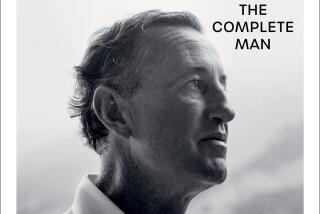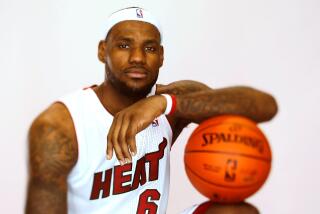BOOK REVIEW / BIOGRAPHY : Intriguing Study of an American Traitor : THE MAN IN THE MIRROR: A Life of Benedict Arnold <i> by Clare Brandt</i> ; Random House, $25, 384 pages
- Share via
When Benedict Arnold “turned his coat” and sold himself to the British, his new masters promptly put him at the head of an expeditionary force and dispatched him to Virginia with orders to burn and pillage at will.
“Arnold interrogated an American prisoner who was not aware of (Arnold’s) identity,” writes Clare Brandt in her new biography of the man whose name is a synonym for traitor. “Asked what the local farmers would do when they captured General Arnold, the man replied that they would first cut off the leg wounded at Saratoga and bury it with honor, then hang the rest.”
And so Brandt makes the point, colorfully enough, in “The Man in the Mirror” that Benedict Arnold was very much a man of parts. As a dashing young officer of the Continental Army, Arnold repeatedly and fearlessly placed himself in harm’s way, and he was hailed among his countrymen as the “patriot-hero” of the Revolution.
At the same time, Arnold was a cynical careerist and shameless social climber, a man who rose to the rank of general in the Continental Army and yet faced a court-martial on charges of smuggling and war profiteering. He may have been “another Hannibal” on the battlefield, but he managed to provoke the open hatred of his comrades-in-arms.
“I honestly wish some person would try an experiment upon him, viz. to make the sun shine through his head with an ounce of (cannon) ball and then see whether rays come in a direct or oblique direction,” one of his brother officers wrote.
Brandt does not try to rehabilitate Arnold, although she insists on showing us his strengths as well as his weaknesses.
“Arnold had astonishing physical valor but no moral courage, a rigid code of ‘honor’ without a shred of inner integrity, and superior intelligence with no understanding,” Brandt writes. “To fill in the gaps, to become the ideal hero he wished to be, Arnold became a master of self-delusion.”
In his own era, Arnold’s failings might have been blamed on a flawed character or a lack of moral fiber. But Brandt insists on a psychological solution to the puzzle of Arnold, and she attributes his darker side--and even his act of treason--to a shattering childhood experience.
When Arnold was 14, Brandt explains, his alcoholic father died suddenly and left the family penniless. Young Benedict Arnold, who aspired to wealth and position in the merchant class of Colonial Connecticut, was forced to leave school and take up an apprenticeship at an apothecary’s shop.
“His world turned upside down,” Brandt writes. “His humiliation was severe; but like many adolescent agonies it remained buried, working its destruction secretly, silently and slowly, deep beneath the skin.”
Brandt’s psychoanalytic take on Arnold is necessarily based on speculation and surmise, but, thankfully, the rest of the book is crafted on sturdy framework of thorough scholarship and engaging prose. Indeed, she displays a real gift for the intricacies of military strategy and military history. Still, Brandt simply cannot resist an occasional flourish so ornate that one suspects a kind of self-parody.
“The landscape of Norwich is precipitous and adamantine,” Brandt writes of Arnold’s birthplace in Connecticut, “much like the interior landscape of its most infamous son.”
Arnold turns out to be a far more complex figure than his mythic role in American history permits us to see. A widower at 36, he courted a 15-year-old girl with deeply romantic and even faintly erotic love letters, and when she turned him down, he used the same lines on Peggy Shippen, a “shrewd and daring” Philadelphia maiden who became his faithful partner in life, love--and treason.
The irony of Arnold’s life is that he committed treason to get rich--and he ended up broke and broken. An aging Arnold found himself shunned by both his native and adoptive countries: He cooked up a grand scheme “to liberate Chile, Peru and (Mexico) from the Dominion of Spain”--but, in the end, was forced to content himself with menial work as a cargo officer on a merchant ship.
Brandt jettisons much of the psycho-historical baggage in the last third of the book and instead gives us an urgent account of the planning and consequences of Arnold’s momentous act of treason. Indeed, at moments “The Man in the Mirror” reads rather like a contemporary spy novel--it’s full of intrigue, life-and-death chases and Colonial-era spy craft, including a secret code based on the 21st edition of Bailey’s Dictionary: “Three numbers make a word.” Brandt reveals, “The first is the page, the second the line, the third the word.”
Brandt appears to overstate the importance of Arnold’s abortive act of treason and the childhood trauma that accompanied the death of his father. But the sheer gusto of her book, the bravado with which she executes her rhetorical maneuvers, are exactly what makes “The Man in the Mirror” such a startling and even invigorating study of a man who has been consigned to the villain’s role in most of our school history books.
More to Read
Sign up for our Book Club newsletter
Get the latest news, events and more from the Los Angeles Times Book Club, and help us get L.A. reading and talking.
You may occasionally receive promotional content from the Los Angeles Times.







